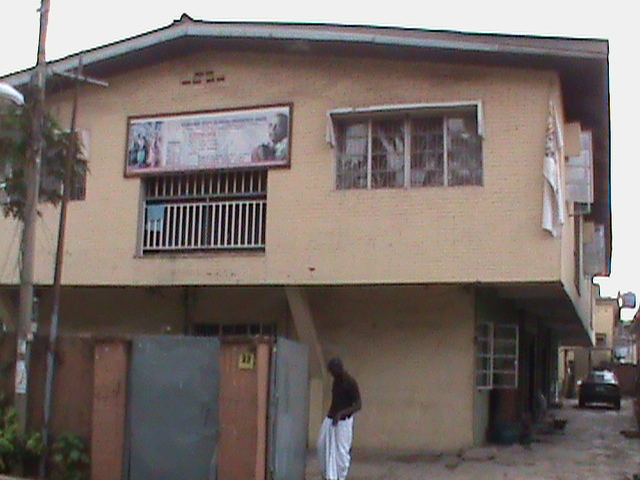Temple Profile: Lagos, Nigeria
By Madhava Smullen | Aug 06, 2011

Name: Sri-Sri Radha-Shyamasundara Mandir
Address: 23 Egbeyemi Street, Ilupeju, Lagos, Nigeria
Phone: +2348069245577, +2348027711097
Website: www.bddswami.com
Presiding Deities: Sri-Sri Radha Shyamasundara, Jagannantha, Baladeva, Subhadra, Sri-Sri Gaura-Nitai, Prahlad-Nrsimha.
President: Yadhunath Dasa
Opened In: July 2009
Temple Style: Simple two-faced bungalow.
Location: The temple is located in the center of Lagos City, close to the International Airport. The area has a mixed community of Indians and local Africans, both of whom the temples works to make itself accessible to. The area is also known for being safer than other parts of Lagos.
Number of Residents: Thirteen.
Number of Visitors: Around twenty per week.
Best time of year to visit: During festival season, from June to July and October to November, although visitors are very welcome any time.
Krishna consciousness first came to Nigeria in 1979, brought by Brahmananda Dasa and the late ISKCON guru Bhakti Tirtha Swami, a charismatic and spiritually-empowered preacher.
In fact, when he could find no place to stay in Lagos, his character and devotion so touched the heart of one Indian man, that he offered the Swami two rooms in his hospital. Although the man had wanted his son to take over the hospital, when his son never turned up, he eventually rented the whole building to Bhakti Tirtha Swami instead. Thus, ISKCON Lagos began.
“My guru did a lot of very dynamic public preaching,” says Bhakti Dhira Damodara Swami, who serves as the GBC’s Regional Secretary for West Africa, and received the renounced order of Sannyasa from Bhakti Tirtha Swami just before his passing in 2005. “He spoke to politicians, local chiefs, and academics, and did interviews on the radio and in popular newspapers. He also bonded with the general public, through lots of Food For Life and Harinamas across the country.”
As a result, ISKCON became very popular in Nigeria, and “Hare Krishna” became a household phrase. Meanwhile, with constant friction between Christian and Muslim groups in the country, the Nigerian government began to respect ISKCON more than any other religious organization for its peaceful stance.
Many people began to join ISKCON, and the Lagos temple filled up with devotees.
Challenges arose, however. As time went on, people moved out of the temple to get married and start families, as they did elsewhere in ISKCON—and the amount of full-time temple devotees dwindled.
Attracting more people to join became difficult, due to the monopoly of established religions, and due to confused ideas about spirituality.
“Africans in general believe in God, but they are often attracted to religion for material reasons such as healing and mystic powers,” says Bhakti Dhira Damodar Swami. “The Christians and Muslims played into this, but since we didn’t, we drew people in smaller numbers. What’s more, the other religions told their congregations that if they followed Krishna consciousness, they would go to hell, which provided some big challenges for us.”
Keeping one building as a temple was also difficult. Devotees regularly moved, even finding themselves squatting for two years between 2007 and 2009.
But they kept their faith in Krishna, and continued spreading His message. And in 2009, things began to turn around. The current temple was acquired in Lagos, and devotees found that although people weren’t joining full-time as they used to, they did welcome Krishna consciousness warmly and danced enthusiastically with the devotees in the public Harinamas they held three times a week.
Today, in Nigeria alone, there are ten ISKCON temples across the country. Meanwhile in Lagos, devotees hold weekly Sunday Feast programs, 24 Hour Kirtans once a month, Ratha-Yatra once a year, and occasional college outreach and Food For Life efforts.
There is also a major focus on spiritual education. Devotees study Bhagavad-gita for one and a half hours every week before their Sunday Feasts, and discuss the Srimad-Bhagavatam during weekly Saturday house programs. There are also regular devotional personal development classes, as well as pre-Bhakti Sastri study of the Sri Isopanishad, Nectar of Instruction, and Nectar of Devotion.
“These are all very important to increase our faith in Krishna consciousness, and protect us from the material energy,” says Bhakti Dhira Damodara Swami. “And they’re working! Now, after so many years, everything is starting to pick up again, and many people are joining as full-time temple devotees. It is very encouraging.”
Next for ISKCON Lagos is an exciting plan for a farm community just outside the city, that will be connected to the current center.
“Bhakti Tirtha Swami worked hard to establish self-sufficient farm communities near Lagos and other Nigerian cities, but we couldn’t maintain them,” says B.D.D Swami. “Now, however, we’re trying to revive the one in Lagos as an offering to him. Recently, one Muslim man, after coming in contact with Krishna consciousness, donated 200 acres of land for the farm. We’re going to see it for the first time this week.”
“It’s a small beginning,” the Swami concludes. “But our hope is that in about five years, we’ll have a full manifestation of the project. Eventually, we would like to see a cow protection department, cottage industries, a temple and guest house, a vocational college, a hospice, and big Harinam and theater departments.”















